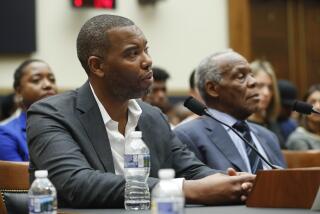Opinion: Criticizing Israel isn’t courageous. Painting a fair, nuanced portrait of ‘settlers’ is
I was excited to read Rabbi Sharon Brous’ op-ed article, “My daughter loves the miracle of Israel. It was time for her to see the other side,” describing her last visit to Israel. After spending time with Brous during that visit, it was apparent to me she had a genuine affection for the Jewish state and its people.
I greatly appreciated Brous’ attempt to show her daughter the complexity of the modern Jewish state. Any nuanced approach to education requires the ability to see things as they are, not as we assumed them to be.
That is why I was confused by the truncated nature of the message in Brous’ article.
I had the privilege of meeting Brous and her delegation just minutes after she visited Hebron. She demonstrated real courage by meeting with “settler” leadership that did not conform to the stereotype that had been choreographed for her in Hebron. In Efrat, where I am the mayor, Brous met a community built upon Jewish values, including co-existence with our Arab neighbors. She was able to challenge and be challenged about the genuine complexities involved in establishing a secure Jewish community while being confronted with the reality of the Palestinian Authority. She was able to sense the sacrifices, risks and genuine empathy that characterizes the Israeli presence in Judea and Samaria.
What would have been candid and courageous is for Brous to have focused her op-ed article on her visit to Efrat. What we showed her here challenged preconceived notions of the conflict and provided a roadmap of how to embrace Israel more completely, thereby unifying our people.
Brous writes that “the message the Israeli government is sending to diaspora Jews: Stick to the playbook. Send Israel your money, your youth, your tourists and your unquestioning loyalty.” I suggest that the truth is more complex than that. Perhaps the same “stick to the playbook” coercion is taking place among the Pavlovian “we must be at fault” crowd, where Jews (or members of any identity group) demonstrate their independence from “group think” by being overly critical.
The same courage Brous demonstrated as a parent in pointing out the shades of gray to her daughter’s previous black-and-white perception of Israel, could be applied again to educate the Jewish world about the nuances she experienced on her visit to Efrat.
Unfortunately, there is nothing courageous about stating that the democratically elected government of Israel has flaws. In fact, that is exactly what one would expect to hear from social justice warriors. The really brave action would be for you to place that playbook aside and tell the world about the real Israel — an Israel that is striving to make the best of an imperfect reality, a reality that does not lift Israel beyond reproach, but also one that is not sanitized to conform to a narrative that is driving diaspora Jewry away from Israel.
While today’s Israel may seem far from ideal — let alone miraculous — it is an Israel that Brous and her daughter can respectfully and emphatically embrace.
Oded Revivi is the mayor of Efrat and the chief foreign envoy of the Yesha Council, which represents the 450,000 Israeli residents of Judea and Samaria.
This piece is part of Blowback, our online forum for rebuttals to The Times. If you would like to write a full-length response to a recent Times article, editorial or Op-Ed and would like to participate in Blowback, here are our FAQs and submission policy.
Follow the Opinion section on Twitter @latimesopinion and Facebook
More to Read
A cure for the common opinion
Get thought-provoking perspectives with our weekly newsletter.
You may occasionally receive promotional content from the Los Angeles Times.










